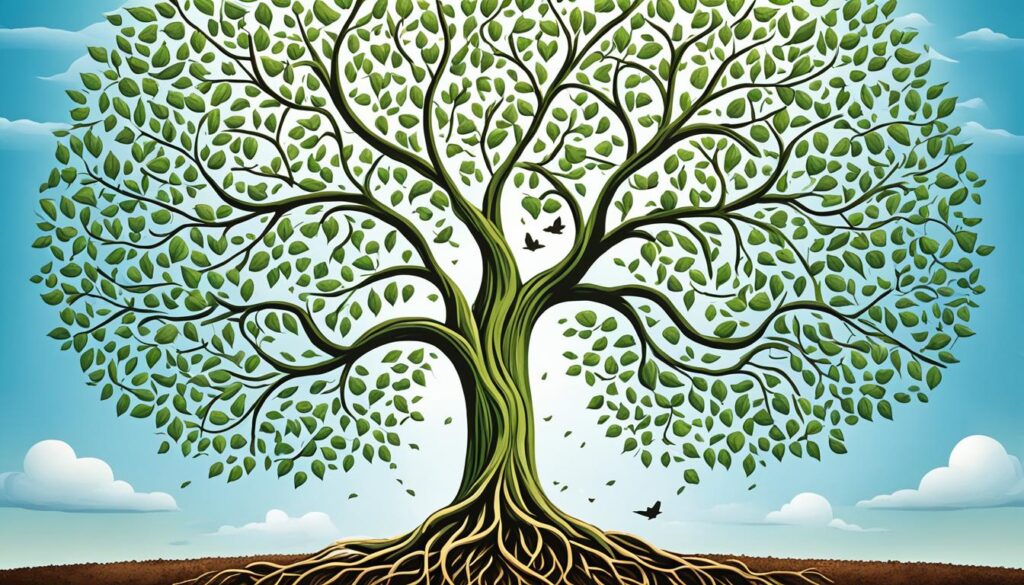Unrequited love is a universal tale that transcends time, cultures, and individuals. It is the poignant narrative of loving someone deeply, only to realize that they do not reciprocate those feelings. We long for their affection, we yearn for their love, but the harsh truth remains: you can’t make someone love you.
In the realm of unrequited love, our desires and efforts hold no sway. No matter how earnestly we pour our hearts out or how desperately we cling to hope, we cannot force someone to love us in return. This painful realization can leave us feeling powerless, rejected, and heartbroken.
But perhaps, in the face of this harsh reality, lies an opportunity for growth and self-discovery. Buddhism teaches us to find acceptance in the things we cannot change and to embrace the present moment with mindfulness and compassion. It reminds us that love, like all things in life, is impermanent and ever-changing.
Key Takeaways:
- Unrequited love is the experience of loving someone who does not love you back.
- You cannot force someone to reciprocate your feelings.
- Acceptance of this limitation is key to navigating the pain of unrequited love.
- Buddhism teaches us to find acceptance in things we cannot change.
- Love, like all things, is impermanent and ever-changing.
The Bitterness of Unrequited Love
Unrequited love can be a bitter and painful experience. It is the profound sorrow that accompanies loving someone who does not love us back. The intensity of our emotions may leave us yearning to undo our feelings or wishing we could rid ourselves of love altogether.
We often resort to various strategies, seeking solace in distractions or attempting to find remedies to alleviate the bitterness. However, these approaches fail to address the fundamental issue: we cannot make someone love us. Unrequited love is arational, not based on rational reasons or justifications. It defies prudential reasons that would typically help us fall out of love. The reality is that we cannot change someone’s feelings towards us, no matter how hard we try.
Dealing with the bitterness of unrequited love requires acknowledging and accepting this painful truth. It is essential to recognize that our unreciprocated love is not a reflection of our worth or desirability. We must focus on healing and finding ways to cope with the rejection, rather than futilely attempting to change someone’s heart.
While it may feel unbearable, remember that you are not alone in this experience. Many have faced the bitterness of unrequited love and emerged stronger on the other side. Seek solace in knowing that your feelings, though unreciprocated, are a testament to your capacity for deep and genuine affection.
Coping with Rejection
When coping with rejection in unrequited love, it is important to prioritize self-care and nurture your emotional well-being. Here are some suggestions to help you navigate this challenging journey:
- Allow yourself to grieve and process your emotions. It is natural to feel sadness, anger, or disappointment. Give yourself permission to feel these emotions without judgment.
- Lean on your support system. Reach out to trusted friends and family members who can provide comfort, understanding, and a listening ear.
- Engage in self-reflection. Take the time to explore your own needs, desires, and aspirations. Redirect your focus towards personal growth and self-improvement. Rediscover the activities and passions that bring you joy.
- Practice self-compassion. Be kind and gentle with yourself as you navigate through the pain of unrequited love. Treat yourself with the same love and care that you would offer to a dear friend.
- Consider seeking professional help if the pain becomes overwhelming or begins to affect your daily life. Therapists can provide valuable guidance and support during this challenging time.
Remember, coping with rejection is a gradual process. Allow yourself the space and time needed to heal. You will emerge from this experience stronger and ready to embrace new beginnings.

Image: A heart in shadows, symbolizing the bitterness and pain of unrequited love.
Advice for Unrequited Love
While it may feel disheartening, unrequited love does not diminish your worth or ability to love deeply. Here are some helpful pieces of advice to help you navigate the complexities of unreciprocated feelings:
- Recognize that love cannot be forced. Embrace the reality that you cannot make someone love you, no matter how strong your feelings are.
- Focus on self-love and self-acceptance. Cultivating a healthy relationship with yourself is crucial in overcoming the bitterness of unrequited love. Treat yourself with kindness, compassion, and respect.
- Acknowledge that rejection is not a reflection of your value. Just because someone does not reciprocate your love does not mean you are unworthy. Your self-worth should never be dependent on someone else’s feelings towards you.
- Redirect your energy towards positive outlets. Engage in activities that bring you joy and fulfillment. Pursue hobbies, invest in self-improvement, and surround yourself with people who uplift and support you.
- Consider the possibility of finding love elsewhere. Opening your heart to new opportunities and connections can lead to unexpected and fulfilling relationships.
- Seek professional help if needed. Therapists can provide guidance, tools, and strategies to help you navigate the complexities of unrequited love and support you on your journey to healing.
Remember, unrequited love is a part of life’s journey. By embracing self-love, practicing resilience, and focusing on personal growth, you can overcome the bitterness and find happiness and fulfillment in other areas of your life.
Embracing Unrequited Love
While unrequited love can evoke bitterness, it can also be a bittersweet experience if we shift our attitude towards it. Unlike rational love, which is based on reasons and justifications, unrequited love is arational, transcending logic and defying explanation. The perplexing question of why we love one particular person over others further solidifies the notion that love is arational. However, there are compelling reasons why we should embrace unrequited love, despite its inherent pain. By embracing our love, even if it is not reciprocated, we can unlock a newfound sense of empowerment and transform our agony into something profound and meaningful.
Unrequited love serves as a distinctive expression of our humanity, demonstrating our capability for boundless and unconditional love. It reveals the depths of our emotions and mirrors the vastness of our capacity to care, regardless of whether it is reciprocated or not. Embracing unrequited love allows us to transcend our own desires and expectations, providing an opportunity to embody selflessness and cultivate a deeper understanding of our own emotions.
By accepting and embracing unrequited love, we step into the realm of unconditional love. This form of love is not contingent on receiving love in return or fulfilling certain conditions. It is a love that flows freely and selflessly, solely aimed at the recipient’s well-being and happiness. Embracing unrequited love enables us to navigate beyond our personal needs and desires, fostering a profound sense of compassion and empathy.
The transformative power of embracing unrequited love
When we embrace unrequited love, we undergo a transformation within ourselves. It transcends the confines of a singular romantic relationship and expands our capacity to love unconditionally. Through this transformative process, we gain a deeper understanding of our own emotions, allowing us to embody empathy, compassion, and forgiveness.
Understanding Unconditional Love
Unconditional love is a powerful and selfless expression of love that transcends expectations or conditions. It is a form of love that is not based on what someone does for us in return, but rather on our genuine desire for their happiness and well-being. While unconditional love is commonly associated with familial relationships, it can also exist in romantic relationships.
Embracing unconditional love brings numerous emotional benefits and contributes to our overall well-being. Research suggests that receiving unconditional love, particularly from parents or caregivers, can lead to greater resilience and better mental health outcomes.
Unconditional love fosters a sense of security and encourages a secure attachment, promoting autonomy, independence, and self-worth. It allows us to love others wholeheartedly, without expecting anything in return. By embracing selfless love, we expand our capacity for empathy, compassion, and understanding.
Here’s an image that epitomizes the essence of unconditional love:

Benefits of Unconditional Love
Embracing and practicing unconditional love offers numerous benefits for both the giver and the recipient:
| Giver | Recipient |
|---|---|
| 1. Fosters emotional well-being and happiness | 1. Experiences a sense of security and acceptance |
| 2. Cultivates empathy and compassion | 2. Develops a healthy sense of self-worth and confidence |
| 3. Strengthens relationships and deepens connections | 3. Feels supported and understood |
| 4. Promotes personal growth and self-discovery | 4. Enhances overall well-being and happiness |
Practicing unconditional love allows us to experience the profound joy that comes from genuinely caring for others without any ulterior motives. It encourages us to see the inherent goodness in people and helps us build more meaningful and fulfilling relationships.
The Realities of Unconditional Love
Unconditional love is a profound and beautiful concept, but it’s essential to acknowledge the realities and challenges that come with it. While the idea of accepting and forgiving unconditionally may seem idealistic, it does not mean turning a blind eye to harmful behavior or neglecting your own well-being.
One of the misconceptions about unconditional love is that it requires us to ignore relationship issues or conflicts. In reality, conflict is a normal part of any relationship, and unresolved issues can create further damage if left unaddressed. By actively working through conflicts and openly communicating, we can cultivate a stronger and healthier bond built on mutual understanding and respect.
Acceptance and forgiveness are integral components of unconditional love, but they do not equate to tolerating abusive behavior or compromising your own needs. It’s crucial to set clear boundaries that protect your emotional and physical well-being. Recognize when a relationship becomes toxic or detrimental, and have the courage to remove yourself from such situations.
Self-care should be a priority in any relationship, including those based on unconditional love. Taking care of yourself not only benefits your own well-being, but it also allows you to show up fully and authentically in the relationship. Remember that selfless love does not mean sacrificing your own happiness or neglecting your own needs.
Unconditional love extends love and forgiveness, but it does not require enduring toxic circumstances or sacrificing your well-being.
Here is a helpful breakdown of the realities of unconditional love:
| Realities of Unconditional Love | Challenges in Unconditional Love |
|---|---|
| Accepting and embracing flaws | Setting boundaries |
| Being patient and understanding | Recognizing toxic behaviors |
| Providing support and care | Prioritizing self-care |
| Forgiving and letting go | Maintaining healthy relationships |
By acknowledging these realities and being mindful of the challenges, you can cultivate a deeper and more meaningful experience of unconditional love. Remember that true unconditional love starts with loving and caring for yourself, and arises when you genuinely value the well-being and happiness of others.

The Complexity of Unrequited Love
Unrequited love is a complex and intricate emotional experience that often stems from deep-rooted issues and personal struggles. Understanding the roots of unrequited love is crucial in order to overcome its challenges and find healing. It often goes beyond just one individual and involves a combination of past experiences, traumas, and our own perceptions of love.
One of the key factors contributing to unrequited love is self-sabotage. Low self-esteem and self-worth can lead us to seek validation and love from those who are incapable or unwilling to reciprocate our feelings. This self-sabotaging behavior can perpetuate a cycle of unrequited love and hinder our ability to build healthy, fulfilling relationships.
To overcome unrequited love, it is important to delve into the underlying issues that contribute to our patterns of seeking love from unattainable sources. This process involves introspection, self-reflection, and a commitment to building a healthier sense of self. By addressing and resolving past traumas and working on our self-esteem, we can break free from the cycle of unrequited love and move towards more fulfilling relationships.
Recognizing Patterns and Breaking the Cycle
Recognizing patterns in our relationships is an essential step in overcoming unrequited love. By identifying commonalities and similarities in our experiences, we can gain a deeper understanding of why we are drawn to individuals who do not reciprocate our feelings. This self-awareness allows us to interrupt the cycle of seeking validation and love in unhealthy ways.
Breaking the cycle requires conscious effort and a commitment to self-growth. It involves setting boundaries, prioritizing self-care, and redirecting our focus towards our own personal development. By shifting our focus from seeking external validation to nurturing our own well-being, we can break free from the pattern of unrequited love and create healthier, more fulfilling relationships.
Healing and Moving Forward
Overcoming unrequited love is a journey of healing and self-discovery. It requires self-acceptance, self-care, and a willingness to let go of attachments that no longer serve us. By embracing our own worth and focusing on personal growth, we can release ourselves from the grip of unreciprocated feelings and open ourselves up to new possibilities.
A table showcasing the journey of healing and overcoming unrequited love:
| Steps to Overcome Unrequited Love |
|---|
| 1. Self-Reflection and Understanding |
| 2. Addressing Past Traumas |
| 3. Building Self-Esteem and Self-Worth |
| 4. Recognizing Patterns and Setting Boundaries |
| 5. Prioritizing Self-Care and Personal Development |
| 6. Letting Go and Opening Up to New Possibilities |

By following these steps and investing in our own personal growth, we can overcome the complexities of unrequited love and create a brighter future filled with meaningful connections and authentic love.
Conclusion
Unrequited love can be an incredibly painful and challenging experience, but it is important to accept its limits in order to move forward and grow personally. The reality is, you cannot make someone love you, no matter how much you desire it or how hard you try. Trying to force someone’s feelings only leads to heartache and disappointment.
However, by embracing unrequited love and understanding the complexities of unconditional love, you can find empowerment and meaning in your experiences. Recognize that unrequited love is not a reflection of your worth or desirability, but rather a natural part of the human experience. It signifies your capacity for deep, genuine love.
As you navigate through the pain of unreciprocated feelings, prioritize self-care and set boundaries. Take time to heal and focus on your personal growth. By investing in yourself, you can create a brighter future free from the grip of unrequited love. Remember, acceptance is the key to moving forward and finding love that is reciprocated, fulfilling, and genuine.

